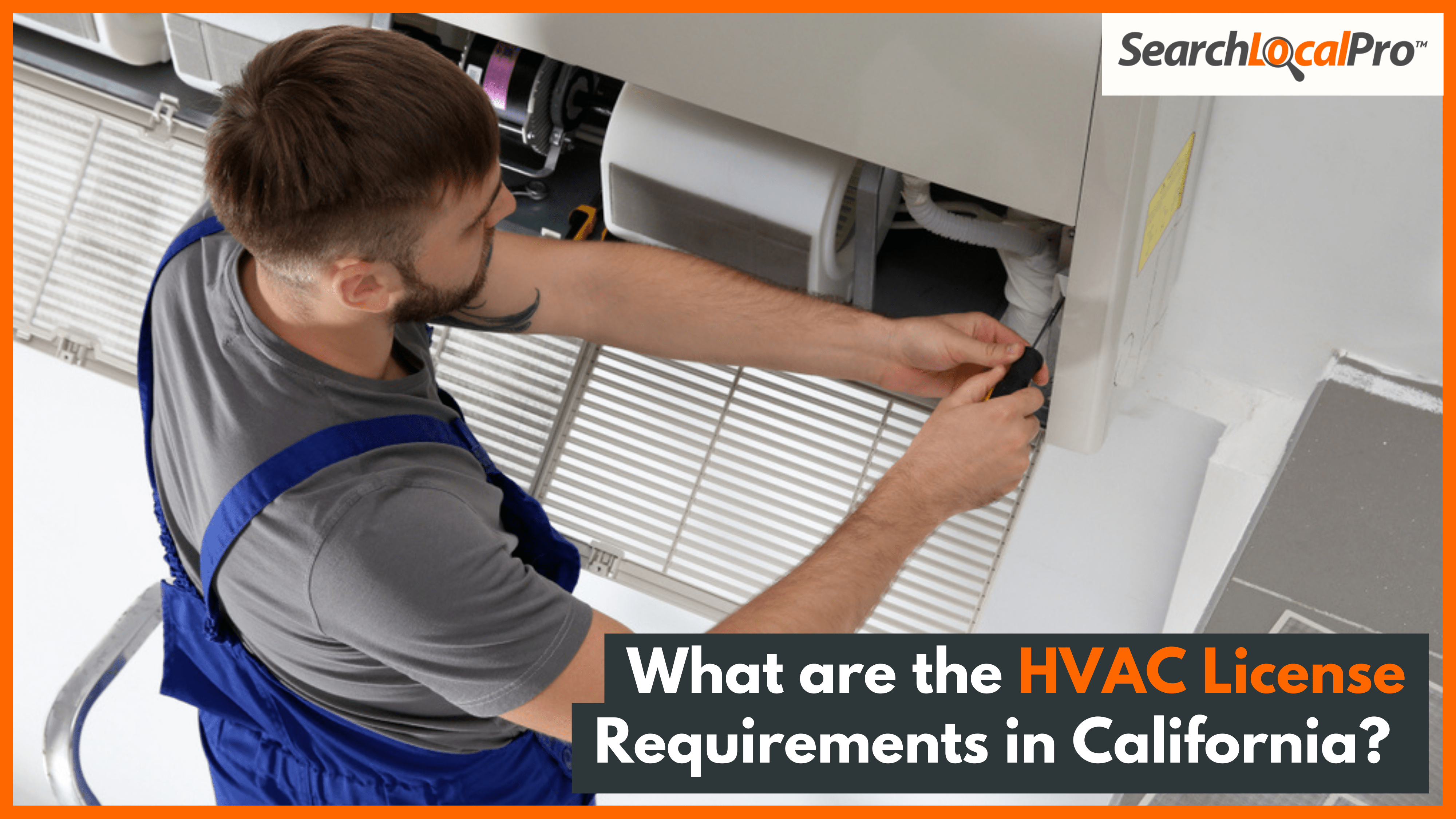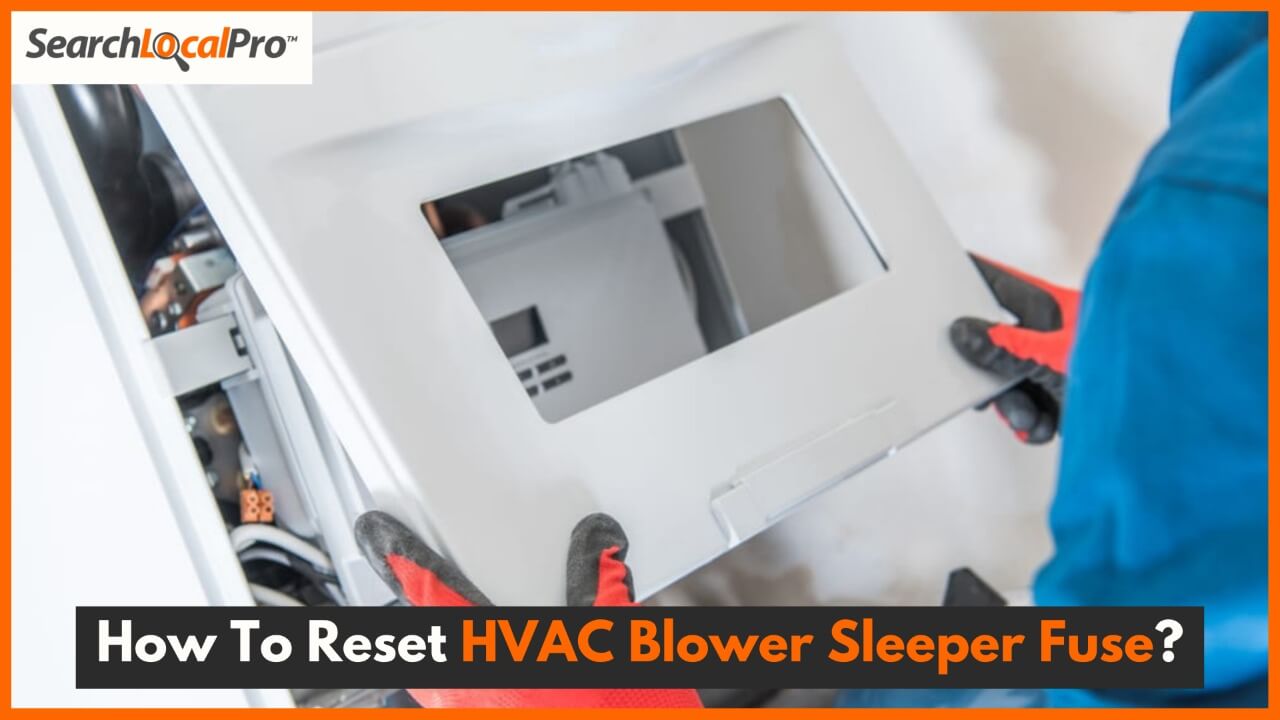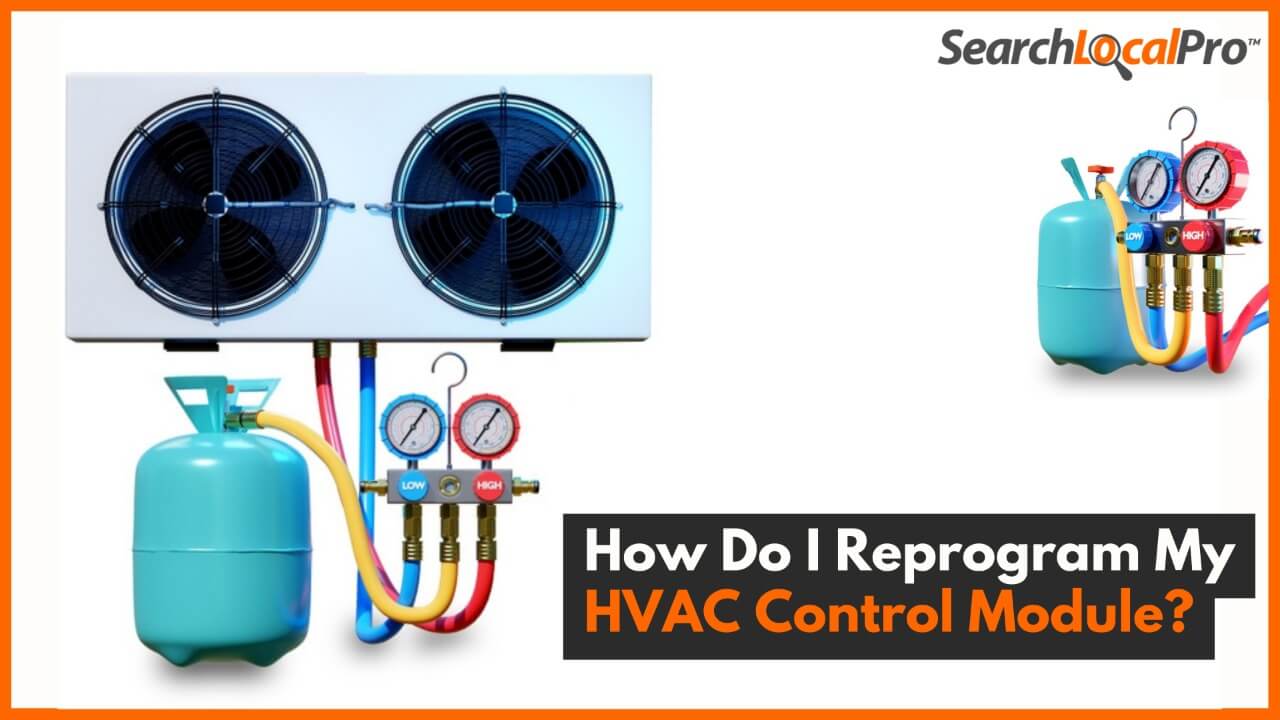Being the first-ranked state compared to others, California has the highest number of HVAC employees, with around 165,307 people in the last year. Therefore, the ratio of building a career or establishing an HVAC business in California can be worth it.
However, getting your HVAC license is necessary before jumping into the practical field. Without an HVAC license, you wouldn’t be able to either join a company as an HVAC technician or start your own business.
Consequently, to make things easier for you, we have thoroughly discussed the procedure, cost, types, and all other HVAC license requirements in California.
So you can start your career with ease. Let’s dig in…
Getting an HVAC License
Getting an HVAC license is essential if you plan to have a successful career in the HVAC industry, whether as a contractor or owning a business.
An HVAC license proves an authentic document that permits you to offer installation, repair, replacement, maintenance, and disposal services for the HVAC appliances and allows you to run your HVAC business legally.
With an HVAC license, the worth of your business or services gets higher as the government validates you. Moreover, it protects you from harm, penalties, and legal difficulties.
The HVAC contractors and companies with licenses are always customers’ priority as the government validates them. Moreover, having them by your side is beneficial as they help in insurance, debts, and effective management of other aspects of the business.
HVAC Contractor License Vs. HVAC Business License: The Differences
Licenses for both contractors and HVAC business owners are separate. The HVAC contractors if for the certified HVAC technicians who practice independently and provide their services for HVAC appliances without working with HVAC companies.
While the HVAC business license is for people in business or technicians planning to get an HVAC business and offer their services or trade the HVAC appliances, this type of HVAC license serves business purposes.
Check our extensive guide on how to get an HVAC license?
What are the Types of HVAC Licenses?

Before issuing the HVAC tech certificate, let’s quickly look at the types of certificates available along with their details.
So, let’s get started!
EPA Section 608 Certification:
EPA 608 certification refers to the laws, rules, and regulations regarding the management of refrigerants.
Made by the Clean Air Act, the EPA certificate is mandatory for every HVAC technician working in the HVAC industry as refrigerants are quite environment-damaging substances, and their mishandling can lead to severe damage to the ozone layer.
Therefore, the 608 certificate validates that the technician knows the legal and correct rules and techniques to manage these refrigerants, which are R-22 (now banned for trade and use in HVAC systems due to highly catastrophic environmental effects) R-410A.
The EPA certifications are further divided into four types. Let’s study them one by one.
Type 1 EPA Certification:
Type 1 EPA certifications permit the HVAC technician to install, repair, maintain and replace small HVAC appliances like household refrigerators, water coolers, and window air conditioners.
Type 2 EPA Certification:
Type 2 EPA certifications permit the HVAC technician to install, repair, maintenance, replace or dispose of appliances that use high amounts of refrigerants, like supermarket refrigerators, residential air conditioners, and heat pumps.
Type 3 EPA Certification:
Type 3 EPA certification permits the HVAC technician to install, repair, maintenance, replace and dispose of appliances that use low-pressure refrigerants like chillers.
Universal EPA Certification:
Universal EPA Certifications permit the HVAC technician to carry out all the services of appliances that are included in type 1, type 2, and type 3 EPA certifications. In short, they are authorized to work on every category of the HVAC system.
NATE License:
Standing for North American Technician Excellence, NATE is the most common yet notable certification for HVAC technicians.
This certificate refers to the general HVAC knowledge and skill-based performance for installing, repairing, maintaining, replacing, and disposing of HVAC equipment, whether small or big, from the commercial or domestic sector.
In short, it includes overall HVAC technician needs and the HVAC industry, which needs to be renewed every two years.
Additional Certifications:
R-410A Technical Certification:
Similar to R-22 (chlorodifluoromethane), R-410A is another widely used refrigerant in HVAC systems. It also has ozone-damaging properties and can be highly catastrophic for the environment if not handled right.
Therefore, R-410A technical certifications allow the tech to rightly handle this refrigerant according to legal rules and the proper techniques.
And as this refrigerant is getting more used compared to R-22 refrigerant, this certificate is one of the most demanding certifications for technicians.
609 Technical Certification:
609 technical certification is specifically for the technicians that provide services for MVAC systems (Motor Vehicle Air Conditioning).
It authorizes the tech to install, repair, maintain, replace, dispose and manage the refrigerants used in it professionally and legally. This HVAC license is quite technical and worthy.
What are the Eligibility Criteria for HVAC California License?
There are two paths for getting eligible for an HVAC license, one being as a journeyman and the second as a student who graduated from a reputable technical or vocational institute.
As a journeyman, you need at least three years of experience working with an HVAC company or a senior and certified HVAC technician.
Moreover, to pass the exam, you should have a basic fundamental knowledge of HVAC systems and appliances and primary skills for maintenance and other services.
And for the second path, your options are 4-year degree programs, diplomas, or certifications. However, your education must be at least six months, theoretical learning, and hands-on practical experience.
Multiple technical colleges and vocational institutes offer degree and certification programs for becoming certified HVAC technicians.
Apprenticeship Programs are another option for qualifying for an HVAC license. However, it is quite a long process and can take longer than a degree or a journeyman’s path. Moreover, preparing for the theoretical exam with apprenticeship experience is also tricky.
Therefore, it is not usually recommended, but you can avail of it if it suits your needs.
What are the Requirements for an HVAC License in California?
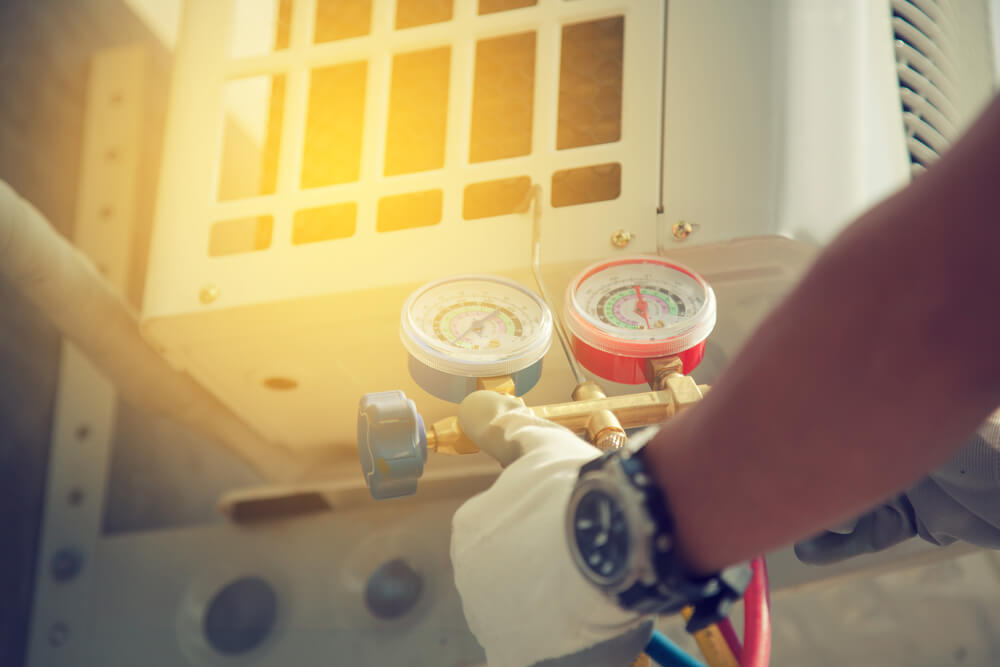
Apart from education and working experience, the following are some of California’s HVAC license requirements, so let’s jump to them straight!
- You must be at least 18 years old.
- You should have your social security number or ID card number.
- You should have at least four years of working experience under a certified HVAC technician or a company, and you need to show the documents for verification.
- You should be knowledgeable enough to pass the exam for HVAC license issuance.
- You have to pay the license fees.
- You have to pass your criminal background exam and give fingerprints for security reasons.
- If you need additional HVAC certifications, you have to pass their exams, pay their fees, and complete other formalities.
What is the Procedure for Getting an HVAC License in California?
- First, if you are fulfilling the HVAC license eligibility criteria, you must apply for the original contractor’s license C-20 from the Contractors State License Board.
- Then, submit all the documents, the 4 years of working experience proof from all the contracting companies, and letters from certified HVAC technicians.
- Now, you will get a date, time, and venue for your license test. The test will be scheduled for after three weeks.
- You have to pass the exam to qualify for the license.
- Submit the fees for the license.
- Then, submit the criminal background check and give fingerprints for safety.
- After a few additional formalities, you will get your HVAC license and permission to practice as an independent HVAC technician in California. Moreover, you can also start your HVAC business.
What does the HVAC License Test in California include?
To get an HVAC license, you have to give two types of exams: the C-20 license exam and the business and law exam, particularly for contractors. So, let’s have a quick review of their syllabus.
C-20 License Exam:
The C-20 exam has four different sections and 115 Multiple Choice Questions, and getting 72% of the total score is mandatory for passing. Also, you’ll have 3 hours to complete the test.
The syllabus for the C-20 license exam includes the following:
- Troubleshooting the problems in HVAC systems
- Repairing, maintenance, and replacement of the HVAC
- Installation and startup of the different systems
- Planning and estimation of the HVAC system
- Safety measurements
Business And Law Exam:
The business and law exam have seven sections containing 115 Multiple Choice Questions. It also has 3 hours for completion of the test.
The syllabus for the HVAC business and law exam includes the following:
- Employment requirements
- HVAC business finances management
- Safety and precautionary measures
- Business management and licensing
- Contracts requirements and organization
- Insurance and liens
These topics are exactly what are covered in the degree, diplomas, and certificate programs of the educational programs of technical schools.
However, getting the journeyman path will make you work on these sections as they are pretty coverable only by theoretical knowledge.
How much can HVAC Certification Cost in California?
When submitting your HVAC Contractor License application to CSLB (California State Licensing Board), you have to submit the $330 with the application for further processing.
And if you pass the exam and straightforward other formalities of getting an HVAC license, you have to pay $200 as fees and submit your work experience certifications.
For asbestos HVAC certification, the cost will be $125, while the fingerprinting and other additional formalities can cost around $30 to $50.
Moreover, the renewal fees for the licenses are separate.
What is the Renewal Period for HVAC License in California?
HVAC License in California is valid for only two years; after this period, you must renew your HVAC license.
The renewal fee for the signal qualifier is $450 and can be quickly done online through the CSLB online portal and website. At the same time, the cost of renewing multiple qualifiers is $700 and can’t be done online.
You have to visit or deliver your previous expired license to the office of CSLB and get it manually done.
What if My HVAC License Expires?
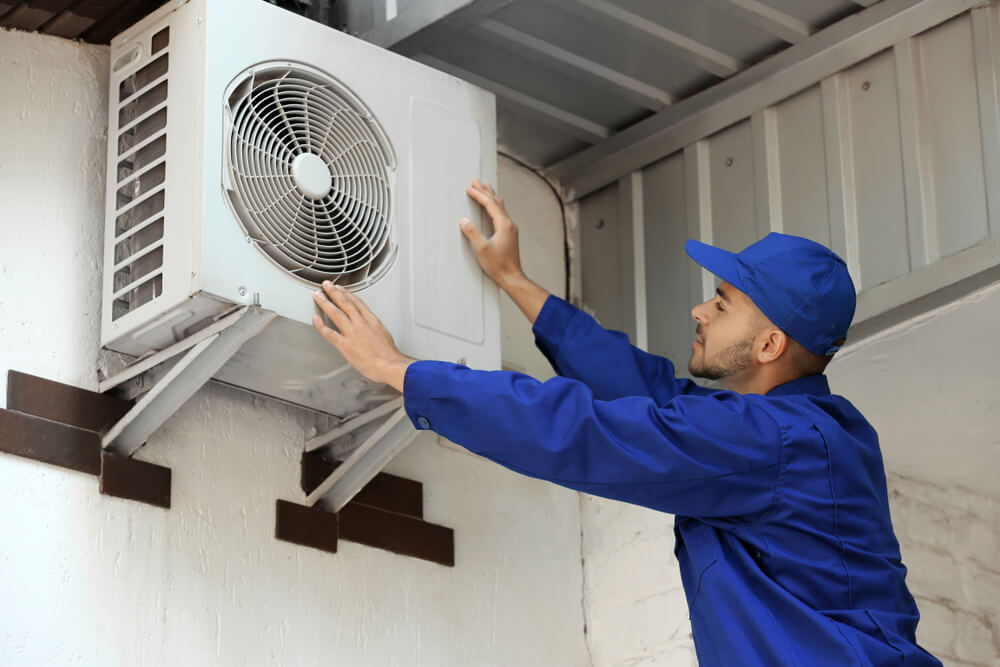
An HVAC license is a legal and professional way of starting your career in the HVAC industry. It not only validates your knowledge of the HVAC machines, their working, and preventive measures but also authenticates you to practice your problem-solving and technical skills.
However, if your HVAC license expires, you have to stop working on the HVAC system immediately as soon as you renew it, as you can end up with heavy penalties on you and your HVAC business.
If you didn’t renew your HVAC license before it expires, you have to pay $450 as renewal fees and $225 as late fees.
So be attentive in the case of your HVAC license and renew it after every two years to avoid paying these skyrocketing penalty fees.
What if I Work Without an HVAC License?
Getting HVAC projects with a license, particularly the ones that cost above $500, can get you in legal difficulties as well as penalties.
You can get jail time from 90 days to 6 months and a penalty of at least $5000. Moreover, you have to pay the administration fees that can cost anything between $200 to $15000.
Moreover, the penalty could be high, but usually, it is 20% of the total contract price.
FAQs: Your HVAC License Concerns
How Can I Apply For The HVAC License?
You have to apply for a license to CSLB (Contractor State License Board) and submit your documents and pay the fees. They will send you a schedule, date, time, and venue for your test.
And if you pass the test, you have to submit other documents, pay the license issuance fees, and clear other protocols like criminal background checks and fingerprinting.
What Are The Requirements For an HVAC License?
The basic requirements for an HVAC license are 18 years of age, four years of practical working experience, theoretical studies of a minimum of 6 months, social security or identification card number, and to pass the exam in which securing 72% of the overall marks is mandatory.
Moreover, there are several additional requirements for an HVAC license, like paying the fees, certifications for four years of working experience, and no criminal history.
What Type Of Certifications is Available For HVAC Licenses?
There are two kinds of HVAC licenses; contract HVAC licenses and business HVAC licenses. And in the case of certifications, there are two major categories; EPA certification, further divided into three types, and NATE certification. Moreover, there are several additional certifications like R-22 and R-410A certifications.
What Does My License Exam Include?
License exams include a theoretical exam as well as practical evaluations. The theoretical exam has 117 Multiple Choice Questions, out of which securing 72% of the total score is mandatory.
It is based on multiple sections, which are all from the topics of the syllabus above. Moreover, the syllabi for both exams are different.
How Much Can An HVAC License Cost?
The HVAC license application costs around $330. And if you pass the exam, you must pay a voucher for $200 with further documents.
For asbestos HVAC certification, the fees will be $125, and fingerprinting and criminal background checks will cost around $30 to $50. And after every two years, the HVAC license renewal fees are separate.
Final Thoughts
An HVAC system is quite complicated, and getting with its legalities is more complex. However, the benefits you get from the HVAC license, whether contractor or business, are worth every effort.
From highlighting your business among your competitors to getting insurance for your company, a license is not a necessity but a mandatory aspect of the HVAC industry.
However, the only limit is you follow the correct guidelines, strategies, and processes for getting the license. Otherwise, you won’t be able to enjoy the skyrocketing worth of the HVAC industry.
Lastly, if you have any questions or confusion, drop them in the comment section given below.


